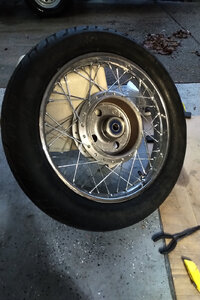Specific question to anybody who's built up spoked wheels before.
I recently rebuilt the rear wheel on my 1980 CB750K with new spokes and nipples from CB750 Supply. I got it trued up, emailed Buchanan's Spokes, and they told me that the rear should be torqued to 60 to 65 inch-pounds. They also said the front should be 40 to 45 inch-pounds and I'm planning to tackle that next.
I bought a fancy Warp9 spoke torque wrench and set it to the correct 65 in-lb, and tightened up my rear wheel every 3rd spoke. My initial level of "true and tight", when I had trued the wheel and kept turning until I heard nice rings from all the spokes, was easily 1 or 2 full turns away from the correct torque spec. That worried me.
What's also got me worried now is just how untrue the wheel now is after the correct torque got applied to all the spokes. I had anti-seize compound on all the threads so they were all lubricated, but some were still harder to turn than others. Maybe poor quality spoke nipples; the kit I ordered was missing one of the inside spokes.
What I'm wondering is how close I need to have the spokes to their spec for safe riding without breaking spokes or ripping out the holes in the hub. I need to true the wheel again and I know all the spokes won't be the correct torque any more if I do that, because some will have to be loosened and others tightened.
I bought the torque wrench to give me an objective setting for all the spokes, but using it has just confused me more.
What's your opinion? Do I need to have them all very close to the torque spec, or could I have them safely be looser as long as all the spokes are reasonably close to each other?
I recently rebuilt the rear wheel on my 1980 CB750K with new spokes and nipples from CB750 Supply. I got it trued up, emailed Buchanan's Spokes, and they told me that the rear should be torqued to 60 to 65 inch-pounds. They also said the front should be 40 to 45 inch-pounds and I'm planning to tackle that next.
I bought a fancy Warp9 spoke torque wrench and set it to the correct 65 in-lb, and tightened up my rear wheel every 3rd spoke. My initial level of "true and tight", when I had trued the wheel and kept turning until I heard nice rings from all the spokes, was easily 1 or 2 full turns away from the correct torque spec. That worried me.
What's also got me worried now is just how untrue the wheel now is after the correct torque got applied to all the spokes. I had anti-seize compound on all the threads so they were all lubricated, but some were still harder to turn than others. Maybe poor quality spoke nipples; the kit I ordered was missing one of the inside spokes.
What I'm wondering is how close I need to have the spokes to their spec for safe riding without breaking spokes or ripping out the holes in the hub. I need to true the wheel again and I know all the spokes won't be the correct torque any more if I do that, because some will have to be loosened and others tightened.
I bought the torque wrench to give me an objective setting for all the spokes, but using it has just confused me more.
What's your opinion? Do I need to have them all very close to the torque spec, or could I have them safely be looser as long as all the spokes are reasonably close to each other?

